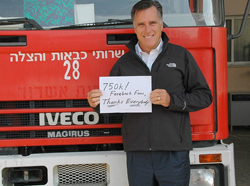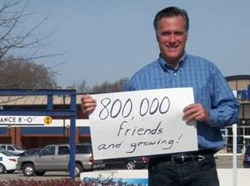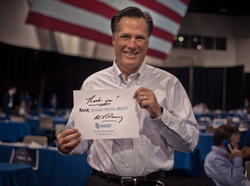
- Home « Campaign Communications «
Facebook
CLICK HERE TO
LIKE P2012
"The Social Media Election"
Although Facebook was active in the 2008 and 2010 campaigns, one can argue that the social media site fully emerged as an important tool for politicians and political campaigns during the course of the 2012 campaign. A Facebook page is now almost a required element of a political campaign, offering a way to build support and communicate with potential supporters. By Election Day, Nov. 6, 2012, Barack Obama had 32,313,965 Facebook friends compared to 12,135,972 for Mitt Romney.1
Facebook experienced phenomenal growth from 2010 to 2012. On October 4, 2012, Facebook founder and CEO Mark Zuckerberg reported, "This morning, there are more than one billion people using Facebook actively each month." A bit more than two years earlier, on July 21, 2010, that number had been 500 million people. (Around this time, in June 2010, Facebook launched its U.S. Politics on Facebook page, which "highlights the use of Facebook by politicians, elected officials, and political campaigns.") The social networking site had come a long way since its beginnings in 2004.
The Pew Research Center for the People & the Press has done a number of studies that give a sense of Facebook users' political activity. An October 19, 2012 report found that, "Some 60% of American adults use either social networking sites like Facebook or Twitter and a new survey by the Pew Research Center’s Internet & American Life Project finds that 66% of those social media users—or 39% of all American adults—have done at least one of eight civic or political activities with social media."2 A June 16, 2011 report, based on activity in the Nov. 2010 election, found that "Facebook users are much more politically engaged than most people."3
Facebook and other social media were a source of information on the campaign for a "limited" but growing number of Americans. A February 2012 report by the Pew Research Center for the People & the Press found that, "Very few Americans regularly learn about the campaign from Facebook (6%) or Twitter (2%)."4 By October 2012 those figures had doubled; the Pew Research Center's Project for Excellence in Journalism found that in the period from October 18-21, 12% of U.S. adults regularly turned to Facebook for campaign news.5
Pre-Campaign Activity
 |
 |
 |
| Jan. 16, 2011 - 750,000
friends |
March 2, 2011 - 800,000
friends |
May 16, 2011 - 900,000
friends |
| Source:
www.facebook.com/mittromney |
Number of Likes on Candidates' and Potential
Candidates' Facebook Pages (May 28, 2011)
| Barack
Obama |
21,081,696 |
| Sarah
Palin |
3,038,533 |
| Mitt
Romney |
926,600 |
| Ron
Paul |
375,670 |
| Michele
Bachmann |
304,623 |
| Newt
Gingrich |
136,879 |
| Herman
Cain |
122,099 |
| Gary
Johnson |
117,971 |
| Tim
Pawlenty |
96,113 |
| Rick
Santorum |
17,422 |
| Roy
Moore |
8,153 |
| Fred
Karger |
1,554 |
| Buddy
Roemer |
1,551 |
Facebook on the Campaign Trail
With NBC News and the Union Leader, Facebook co-sponsored the Jan. 8, 2012 Republican presidential primary debate in Concord, New Hampshire. On Aug. 27, 2012 Facebook and CNN announced "Election Insights," "a real-time tool [that] measures Obama, Romney, Biden, and Ryan buzz." Facebook also had booths in the media work spaces at the Republican and Democratic National Conventions in Tampa and Charlotte. On Election Day, Facebook provided several features to encourage people to participate.
Secrets to Success
Much as one would like to imagine the candidate putting up regular Facebook entries, most often it is a staffer or consultant actually writing them. A Nov. 11, 2012 posting by the Facebook political team listed four keys to social media success:
1. Speak with an authentic voice. In an
ideal
world the candidate will from time to time post to Facebook himself or
herself. Nothing beats having people hear directly from the candidate.
But if that’s not going to happen it's important for the candidate to
still check the campaign's Facebook page regularly to see what kinds of
comments people are sharing. It's also important to ensure that a
page's posts accomplish more than linking to press releases or donation
pages.
2. Integrate Facebook into everything. People sharing information on Facebook doesn’t just exist on Facebook.com. Use Facebook social plugins, third-party applications and Facebook advertisements to make it easy for voters to learn about your page, share your content, and connect with other voters. Put your Facebook URL on your direct mail and on your television ads and ask people to join the discussion on Facebook. Live-stream your events on Facebook and take questions from those in the audience and watching online.
3. Engagement is key. The best thing a campaign can do is engage with people on Facebook. Ask them to offer their opinions, pose questions, and be a part of the campaign.
4. Measure success. Use Facebook Insights for your page, domain, and ads to learn what content your fans engage with the most, how many people are seeing your content and how large your reach is on Facebook.
Metrics (of all of its activities) was one of the
cornerstones of the Obama campaign. The Obama campaign also
developed a Facebook app that proved successful. Target sharing allowed the
campaign to see a supporter's friend list, and
determine, for example, who the supporter was interacting with
most. Then, with
fast access to the voter file, the campaign could match those names
against the voter file to figure out who each person was.
Finally, it
could ask the supporter to make specific requests of particular
friends, for example, to watch a video or contribute or vote
early. 2. Integrate Facebook into everything. People sharing information on Facebook doesn’t just exist on Facebook.com. Use Facebook social plugins, third-party applications and Facebook advertisements to make it easy for voters to learn about your page, share your content, and connect with other voters. Put your Facebook URL on your direct mail and on your television ads and ask people to join the discussion on Facebook. Live-stream your events on Facebook and take questions from those in the audience and watching online.
3. Engagement is key. The best thing a campaign can do is engage with people on Facebook. Ask them to offer their opinions, pose questions, and be a part of the campaign.
4. Measure success. Use Facebook Insights for your page, domain, and ads to learn what content your fans engage with the most, how many people are seeing your content and how large your reach is on Facebook.
Notes
1. Jennifer Moire. "Facebook By The Numbers: The 2012 Presidential Race." All Facebook (The Unofficial Facebook Blog), Nov. 26, 2012.
2. Pew Research Center for the People & the Press. "Social Media and Political Engagement." Oct. 19, 2012. >
3. Pew Research Center for the People & the Press. "Social networking sites and our lives." July 16, 2011. >
4. Pew Research Center for the People & the Press. "Cable Leads the Pack as Campaign News Source." Feb. 7, 2012. >
5. Pew Research Center Project for Excellence in Journalism. "Internet Gains Most as Campaign News Source But Cable TV Still Leads." Oct. 25, 2012. >
6. John Dickerson. "Not Sarah Palin's Friends." Slate, Aug. 3, 2010. >
7. Metrics of all activities was one of the cornerstones of the Obama campaign. In terms of independent analyses, Socialbakers, a social media analytics firm, has done some interesting work looking at Facebook activity. The firm has devised a range of metrics including viral reach ("the total number of 'likes' and comments multiplied by the average number of friends per Facebook user), total interactions ("all 'likes' and comments from a candidate's posts plus all 'likes and comments from people's posts on the candidate's page"), and average post engagement rate ( [[likes+comments+shares on a given day / wall posts made by page administrator on a given day] /total fans on a given day] x 100.
For example Socialbakers' Super Tuesday study tallied the posts and interactions in the month preceding March 6, 2012: Romney 109 total posts, 682,328 total Facebook interactions, Santorum 268 total posts, 513,130 total Facebook interactions, Paul 50 total posts, 508,879 total Facebook interactions, and Gingrich 52 total posts, 303,991 total Facebook interactions. The study also breaks down the types of posts and looks at the number of interactions they generate.
candidates - B.Obama (D) | M.Romney (R) | G.Johnson (L) | J.Stein (G) | V.Goode (C)
more - Democratic National Convention | Republican National Convention
former Republican candidates - Bachmann | Cain | Huntsman | Gingrich | Karger | McCotter | Paul | Pawlenty | Perry | Santorum || (Palin)
more former candidates - Roemer | Americans Elect
